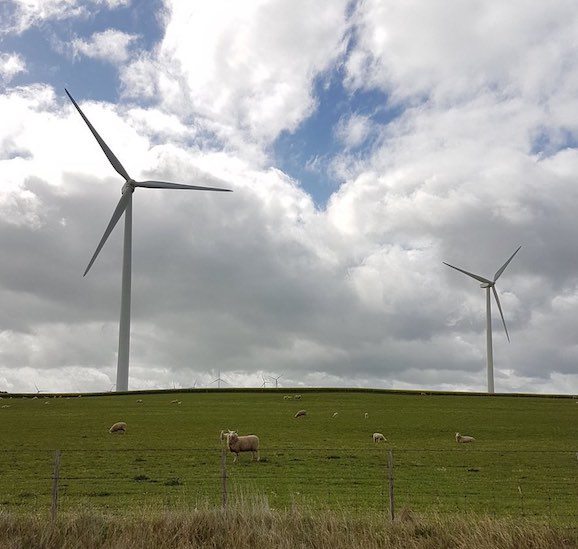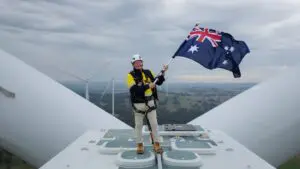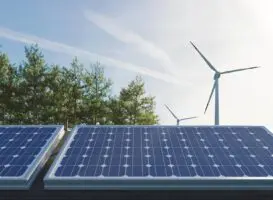
Victoria has become the first state in Australia to have its renewable energy target written into law, after the Labor Andrews government’s Renewable Energy (Jobs & Investment) Bill was passed by Parliament on Friday.
State energy minister Lily D’Ambrosio said on Friday the governments’ VRET of 25 per cent renewable energy by 2020, and 40 per cent by 2025, had passed the Legislative Council with 20 votes to 18, and despite not winning a single vote from the opposition Coalition party.
#VRET passed the Legislative Council 20-18, despite all Libs and Nats voting against it. Thank you to the community campaigners for your fantastic support #springst
— Lily D’Ambrosio MP (@LilyDAmbrosioMP) October 20, 2017
The “historic” vote comes amid growing confusion and concern about what the federal Coaltion’s National Energy Guarantee means for Australia’s energy sector, and particularly for the renewable energy industry, with no national renewable energy target in place beyond 2020, and the suggestion development could go backwards under the new plan, resulting in just 28-36 per cent renewables by 2030.
The state governments, in particular, have reacted with frustration to the NEG, which – as Giles Parkinson pointed out here on Friday – is a decision by the Turnbull government to essentially rely on the same state-based renewables targets it has so often derided as reckless.
All of Australia’s Labor states and territories have their own renewable energy targets, each of them more ambitious than the federal government’s goal of 20 per cent by 2020.
Queensland and the Northern Territory are aiming for 50 per cent by 2030; South Australia is already there but looking to add more; while the ACT has already signed contracts with wind and solar farms to take it to 100 per cent renewables by 2020.
Victoria’s own target, now legislated, is expected to cut the average cost of power for households by around $30 a year; $2,500 a year for medium businesses and $140,000 a year for large companies. It is also forecast to drive a 16 per cent reduction in the state’s electricity sector emissions by 2034-35, and create up to 11,000 jobs.
Despite these projected benefits, the state targets have been used regularly by the federal government as scapegoats for rising electricity prices and the closure of ageing coal plants – an irony that is not lost on the states, particularly considering the federal Coalition needs their approval for the NEG to be put into place, because it requires significant changes to the National Electricity Market rules.
The Victorian upper house has just passed the #VRET — Vic getting on with it while Turnbull plays politics #SpringSthttps://t.co/FuCQscfjLz
— Environment Victoria (@EnviroVic) October 20, 2017
“Renewable energy creates jobs and will help drive down power prices for Victorian households and businesses,” said D’Ambrosio, in a statement on Friday.
“These legislated targets remain the one constant for renewable energy investor confidence in Australia and the message is clear — Victoria is open for business.”
The Clean Energy Council was quick to welcome the news, and said the VRET would provide major investment opportunities for the state into the next decade.
“The VRET provides a green light for our industry to deliver cheap, clean and reliable energy for all Victorians,” said CEC CEO Kane Thornton on Friday.
“The easiest way to reduce power prices is through clear policy and more power generation. The VRET delivers on both these fronts and the Victorian Renewable Energy Auction Scheme will kick off in just a few weeks to deliver up to 650MW of new renewable energy projects.”
Green groups also welcomed the passage of the VRET, particularly in light of policy developments in Canberra.
Wonderful news: Victoria has just passed a Renewable Energy Target of 40% by 2025! That’s what leadership on energy looks like! #VRET
— ACF (@AusConservation) October 20, 2017
“In a week when the federal government has been playing politics with our climate, this vote signals that Victoria is getting on with the job of repowering our state with clean energy,” said Environment Victoria CEO Mark Wakeham.
But Wakeham also expressed his concern that the state Coalition appeared to be in lock-step with its federal counterpart, and had threatened to scrap the legislation if elected next year.
“It is deeply disappointing that Matthew Guy’s Coalition is again denying Victorians lower power prices, clean energy and jobs and investment across the state,” he said.
“This week’s antics in Parliament suggest that the recent track record of Coalition attacks on our environment will continue through to next year’s state election. In the past 12 months, Matthew Guy’s Coalition has voted against a new Climate Change Act, voted against encouraging more rooftop solar, and now voted against large-scale renewable energy – the cheapest and cleanest form of new electricity.
“Victorians are sick and tired of Coalition energy wars. We’re ready to embrace a booming renewable energy industry that cuts prices and pollution. If the Coalition wish to remain relevant to Victorian voters then they need to get on board with Victoria’s clean energy future,” Wakeham said.
Thankyou Min @LilyDAmbrosioMP your leadership on Victoria’s Renewable Energy Target means Vic now leads the country #vret #auspol #springst pic.twitter.com/K5APsudjGv
— Yes 2 Renewables (@Yes2Renewables) October 20, 2017
The state Coalition party, meanwhile, continues to oppose the renewables target, which opposition leader Matthew Guy has repeatedly described as “Daniel Andrews’ reckless, go-it-alone VRET.”
And while the LNP appears to have made little comment about Friday’s passage of the Bill, it has previously vowed to have it scrapped if successful in next year’s state election.
“This is a bill which is about making life harder for ordinary Victorians, because we have to understand the human cost of the moral and political vanity that is contained within this bill,” said shadow Treasurer Michael O’Brien in Parliament late last month.
“Labor and the Greens say, ‘This is fantastic. Let’s go back to the Stone Age. Let’s try to get rid of electricity. It’s far better for people to feel the moral pain of paying higher bills, because that saves the planet somehow’ — what utter garbage,” O’Brien said.
“This is why this is a bad bill. It is why we will not only oppose it but, if this has the misfortune of passing this Parliament, we will repeal it.”
Friends of the Earth – which has been one of the key drivers of the VRET Bill – was also critical of Guy’s opposition, and said it ignored that renewables enjoyed strong support among Liberal party voters.
“In 2017, it’s unacceptable for politicians to vote against policies to tackle climate change,” said Leigh Ewbank, Friends of the Earth’s climate change spokesperson.
“With unprecedented bleaching of the Great Barrier Reef and parts of Victoria experiencing a record dry June, now’s not the time to be blocking action on climate change.”
“Victorians will remember the opposition’s vote against renewable energy jobs and cheaper power when they go to the polls in 2018.”










